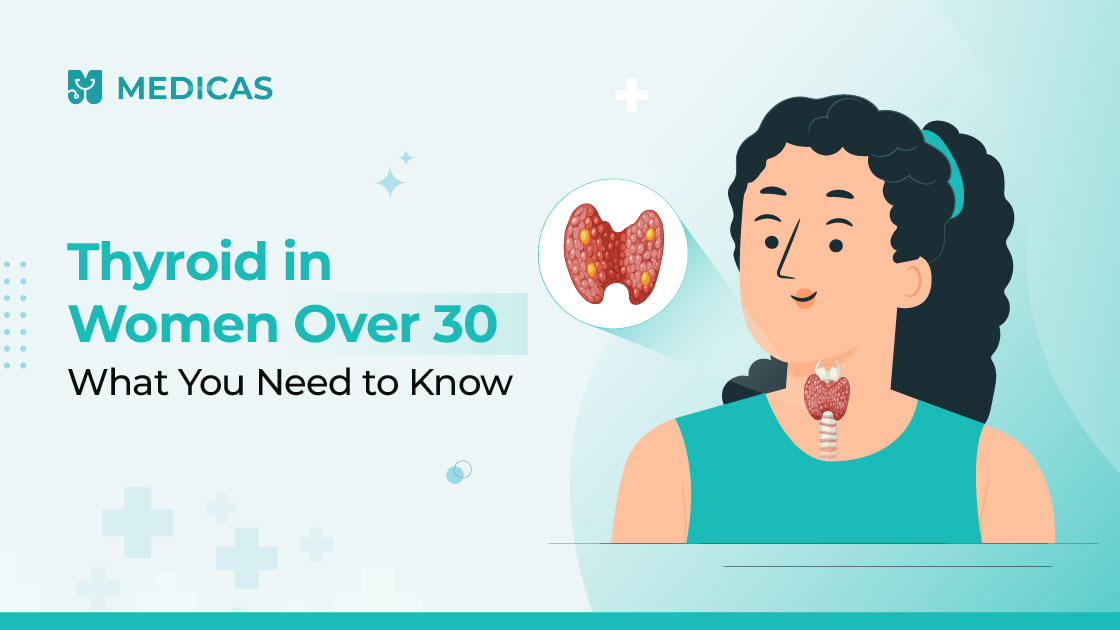What Is Thyroid and Why It Affects Women More?
The thyroid is a small, butterfly-shaped gland located at the base of your neck. It produces two essential hormones—T3 and T4—that regulate your metabolism, energy levels, body temperature, and even your mood. In essence, the thyroid acts as the body’s thermostat and energy manager. Women, however, are disproportionately affected by thyroid dysfunction. Hypothyroidism (underactive thyroid) is especially common, and the risk increases significantly after age 30. This is often due to hormonal shifts, such as those during pregnancy, postpartum, and perimenopause. Autoimmune conditions like Hashimoto’s thyroiditis, which causes the immune system to attack the thyroid gland, are also more prevalent in women. In addition, thyroid issues often run in families. If your mother or sister has a thyroid disorder, your chances are higher too. Knowing your personal and family history, along with being aware of subtle symptoms, can make a big difference in getting an early and accurate diagnosis.Common Symptoms of Thyroid in Women
Thyroid symptoms in women can be subtle at first, but they tend to snowball over time. What makes it tricky is that these symptoms often mimic those of everyday stress, anemia, depression, or hormonal imbalances. That’s why so many women go undiagnosed for months—or even years. Some of the most common symptoms of hypothyroidism include:- Unexplained fatigue that doesn’t improve with rest
- Weight gain despite no major changes in diet or activity level
- Irregular or heavy periods
- Hair thinning or hair loss
- Dry, flaky skin
- Feeling cold even when others are comfortable
- Constipation
- Mood swings or depression
Why Is Thyroid Common After 30 in Women?
Several factors contribute to the increased prevalence of why thyroid is common in women after 30. Hormonal changes, autoimmune disorders, and lifestyle factors all play a role. Let’s delve deeper into these contributing elements.Pregnancy, PCOS, and Lifestyle Stress
Pregnancy and Polycystic Ovary Syndrome (PCOS) can significantly impact thyroid function. High stress levels and poor dietary habits can also exacerbate symptoms of thyroid problems in females over 30. Managing these factors can help mitigate the risk. Here’s a breakdown:- Pregnancy: The body undergoes massive hormonal changes.
- PCOS: This hormonal disorder often affects thyroid function. Also Read: Understanding PCOS: Symptoms, Diagnosis & Management
- Stress: Chronic stress impacts hormonal balance
How to Detect Thyroid Problems in Women
Early detection is not just helpful—it’s crucial when it comes to managing thyroid conditions effectively. Many women live with thyroid issues for years before being diagnosed, often because the symptoms are brushed off as signs of stress, aging, or lifestyle burnout. But the earlier a thyroid condition is identified, the easier it is to treat and manage, helping you avoid long-term complications. The first step is paying close attention to your body. Persistent fatigue, sudden changes in weight, irregular periods, mood swings, and even something as simple as feeling cold all the time can be red flags. If these symptoms cluster together or continue for weeks or months, it’s time to dig deeper. Once you suspect a thyroid issue, the next step is medical evaluation. A doctor will typically recommend a blood test to check your TSH (thyroid-stimulating hormone) levels, along with free T3 and free T4 levels to get a clearer picture of thyroid function. In some cases, thyroid antibodies may also be tested to identify autoimmune thyroid conditions like Hashimoto’s or Graves’ disease. Women over 30—especially those with a family history of thyroid disorders, PCOS, or autoimmune conditions—should consider routine screening, even if symptoms are mild. Don’t wait for your symptoms to become overwhelming. The sooner you detect an imbalance, the sooner you can start feeling better.Blood Tests, Ultrasound & Clinical Diagnosis
The primary method of diagnosis is a blood test to measure TSH (thyroid-stimulating hormone) and T4 (thyroxine) levels. An ultrasound may be used to examine the thyroid gland’s structure. A thorough clinical evaluation by a doctor is essential for accurate diagnosis. Book Lab Test to get your thyroid levels checkedTreatment Options for Thyroid in Women
Fortunately, several effective treatment options are available for thyroid disorders. These range from medication to lifestyle adjustments, tailored to the specific condition and individual needs. Finding the right approach can significantly improve your quality of life.Medication, Diet Changes, and Lifestyle Management
Medication, particularly synthetic thyroid hormones, is commonly prescribed to treat hypothyroidism. Dietary changes, such as increasing iodine intake and avoiding processed foods, can support thyroid function. Stress management techniques and regular exercise are also beneficial. For more on improving your health using natural methods, check out these Home remediesWhen to See a Doctor
If you experience persistent fatigue, unexplained weight changes, or other concerning symptoms, it’s important to consult a healthcare professional. Early diagnosis and treatment can prevent complications and improve your overall health.Consider online doctor consultation for easy, hassle-free assessment.Conclusion
Understanding the nuances of thyroid in women, especially after 30, is crucial for maintaining optimal health. By recognizing the symptoms, seeking timely medical advice, and adopting a healthy lifestyle, you can effectively manage thyroid conditions and improve your well-being. Why wait? Book appointment today.Frequently Asked Questions
- What are the early signs of thyroid problems in women?
- Is thyroid curable in women after 30?
- Can thyroid cause infertility in women?
- Can thyroid problems cause weight gain in women?
- How is thyroid diagnosed in females?
Disclaimer
Medical Advice: The information provided in this blog post is for educational purposes only and should not be considered as a substitute for professional medical advice, diagnosis, or treatment. Always consult with a qualified healthcare professional for personalized guidance regarding your specific medical condition.
Accuracy of Information: While we strive to provide accurate and up-to-date information, the field of medicine and viral fevers is constantly evolving. The content in this blog post may not reflect the most current research or medical guidelines. Therefore, it is advisable to cross-check any information provided with reliable sources or consult a healthcare professional.
Individual Variations: The symptoms, causes, treatment options, and preventive measures discussed in this blog post are general in nature and may not apply to everyone. It is important to remember that each individual’s situation is unique, and personalized medical advice should be sought when making healthcare decisions.
External Links: This blog post may contain links to external websites or resources for additional information. However, we do not endorse or have control over the content of these third-party websites. Accessing these links is done at your own risk, and we are not responsible for any consequences or damages that may arise from visiting these external sources.
Results May Vary: The effectiveness of treatment options or preventive measures mentioned in this blog post may vary from person to person. What works for one individual may not work the same way for another. It is essential to consult with a healthcare professional for personalized advice tailored to your specific needs.

Dr. Sweekruti Jena is an Endocrinologist and Diabetologist based in Bhubaneswar, Odisha, with 6 years of clinical experience. She holds an MBBS (Hons.), an MD in Internal Medicine, and a DM in Endocrinology. Her areas of expertise include diabetes, thyroid disorders, obesity, growth and puberty issues, and calcium-bone metabolism disorders. Dr. Jena is also a recipient of the TYSA Award (Runner-up) by the Endocrine Society of India.


